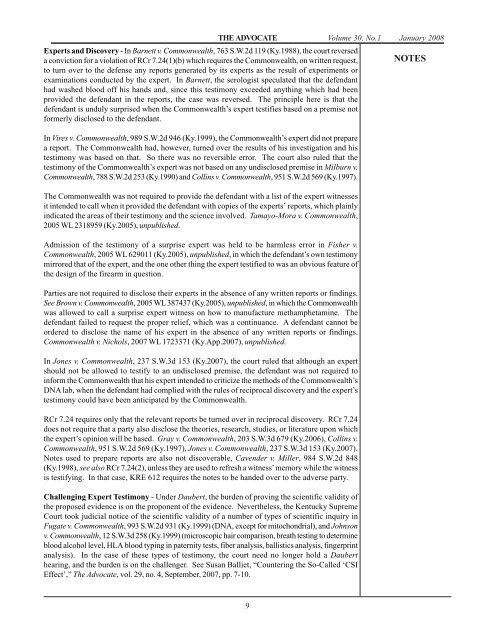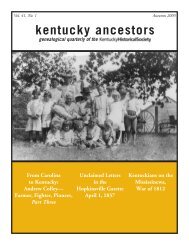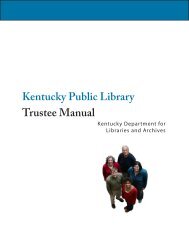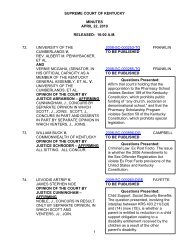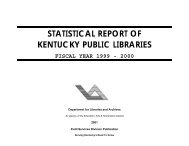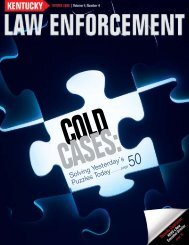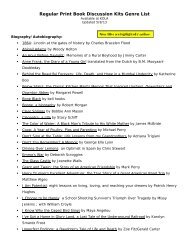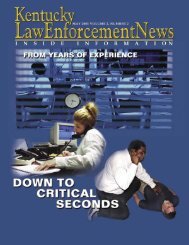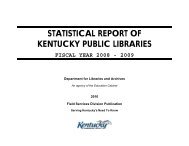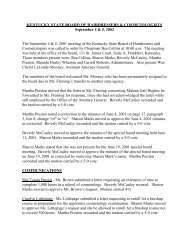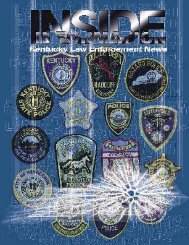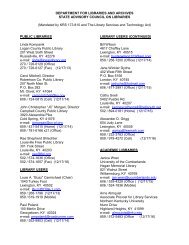Jan08 Advo.pmd - e-archives Home
Jan08 Advo.pmd - e-archives Home
Jan08 Advo.pmd - e-archives Home
Create successful ePaper yourself
Turn your PDF publications into a flip-book with our unique Google optimized e-Paper software.
THE ADVOCATE Volume 30, No.1 January 2008<br />
Experts and Discovery - In Barnett v. Commonwealth, 763 S.W.2d 119 (Ky.1988), the court reversed<br />
a conviction for a violation of RCr 7.24(1)(b) which requires the Commonwealth, on written request,<br />
to turn over to the defense any reports generated by its experts as the result of experiments or<br />
examinations conducted by the expert. In Barnett, the serologist speculated that the defendant<br />
had washed blood off his hands and, since this testimony exceeded anything which had been<br />
provided the defendant in the reports, the case was reversed. The principle here is that the<br />
defendant is unduly surprised when the Commonwealth’s expert testifies based on a premise not<br />
formerly disclosed to the defendant.<br />
In Vires v. Commonwealth, 989 S.W.2d 946 (Ky.1999), the Commonwealth’s expert did not prepare<br />
a report. The Commonwealth had, however, turned over the results of his investigation and his<br />
testimony was based on that. So there was no reversible error. The court also ruled that the<br />
testimony of the Commonwealth’s expert was not based on any undisclosed premise in Milburn v.<br />
Commonwealth, 788 S.W.2d 253 (Ky.1990) and Collins v. Commonwealth, 951 S.W.2d 569 (Ky.1997).<br />
The Commonwealth was not required to provide the defendant with a list of the expert witnesses<br />
it intended to call when it provided the defendant with copies of the experts’ reports, which plainly<br />
indicated the areas of their testimony and the science involved. Tamayo-Mora v. Commonwealth,<br />
2005 WL 2318959 (Ky.2005), unpublished.<br />
Admission of the testimony of a surprise expert was held to be harmless error in Fisher v.<br />
Commonwealth, 2005 WL 629011 (Ky.2005), unpublished, in which the defendant’s own testimony<br />
mirrored that of the expert, and the one other thing the expert testified to was an obvious feature of<br />
the design of the firearm in question.<br />
Parties are not required to disclose their experts in the absence of any written reports or findings.<br />
See Brown v. Commonwealth, 2005 WL 387437 (Ky.2005), unpublished, in which the Commonwealth<br />
was allowed to call a surprise expert witness on how to manufacture methamphetamine. The<br />
defendant failed to request the proper relief, which was a continuance. A defendant cannot be<br />
ordered to disclose the name of his expert in the absence of any written reports or findings.<br />
Commonwealth v. Nichols, 2007 WL 1723371 (Ky.App.2007), unpublished.<br />
In Jones v. Commonwealth, 237 S.W.3d 153 (Ky.2007), the court ruled that although an expert<br />
should not be allowed to testify to an undisclosed premise, the defendant was not required to<br />
inform the Commonwealth that his expert intended to criticize the methods of the Commonwealth’s<br />
DNA lab, when the defendant had complied with the rules of reciprocal discovery and the expert’s<br />
testimony could have been anticipated by the Commonwealth.<br />
RCr 7.24 requires only that the relevant reports be turned over in reciprocal discovery. RCr 7.24<br />
does not require that a party also disclose the theories, research, studies, or literature upon which<br />
the expert’s opinion will be based. Gray v. Commonwealth, 203 S.W.3d 679 (Ky.2006), Collins v.<br />
Commonwealth, 951 S.W.2d 569 (Ky.1997), Jones v. Commonwealth, 237 S.W.3d 153 (Ky.2007).<br />
Notes used to prepare reports are also not discoverable, Cavender v. Miller, 984 S.W.2d 848<br />
(Ky.1998), see also RCr 7.24(2), unless they are used to refresh a witness’ memory while the witness<br />
is testifying. In that case, KRE 612 requires the notes to be handed over to the adverse party.<br />
Challenging Expert Testimony - Under Daubert, the burden of proving the scientific validity of<br />
the proposed evidence is on the proponent of the evidence. Nevertheless, the Kentucky Supreme<br />
Court took judicial notice of the scientific validity of a number of types of scientific inquiry in<br />
Fugate v. Commonwealth, 993 S.W.2d 931 (Ky.1999) (DNA, except for mitochondrial), and Johnson<br />
v. Commonwealth, 12 S.W.3d 258 (Ky.1999) (microscopic hair comparison, breath testing to determine<br />
blood alcohol level, HLA blood typing in paternity tests, fiber analysis, ballistics analysis, fingerprint<br />
analysis). In the case of these types of testimony, the court need no longer hold a Daubert<br />
hearing, and the burden is on the challenger. See Susan Balliet, “Countering the So-Called ‘CSI<br />
Effect’,” The <strong>Advo</strong>cate, vol. 29, no. 4, September, 2007, pp. 7-10.<br />
9<br />
NOTES


